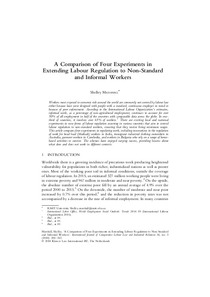A comparison of four experiments in extending labour regulation to non-standard and informal workers

The International Journal of Comparative Labour Law and Industrial Relations
2018
34
3
September
281-311
informal employment ; labour law ; comparison
Australia ; Bulgaria ; Cambodia ; India
Employment
http://www.kluwerlawonline.com
English
"Workers most exposed to economic risk around the world are commonly not covered by labour law either because laws were designed with people with a standard, continuous employer in mind or because of poor enforcement. According to the International Labour Organization's estimates, informal work, as a percentage of non-agricultural employment, continues to account for over 50% of all employment in half of the countries with comparable data across the globe. In onethird of countries, it involves over 65% of workers.1 There are exciting local and national experiments in new forms of labour regulation occurring in various countries that aim to extend labour regulation to non-standard workers, ensuring that they receive living minimum wages. This article compares four experiments in regulating work, including innovations in the regulation of work for head load (Mathadi) workers in India, immigrant industrial clothing outworkers in Australia, garment workers in Cambodia, and workers in Bulgaria who rely on a range of homebased activities to survive. The schemes have enjoyed varying success, providing lessons about what does and does not work in different contexts. "
Digital
The ETUI is co-funded by the European Union. Views and opinions expressed are however those of the author(s) only and do not necessarily reflect those of the European Union or the ETUI.